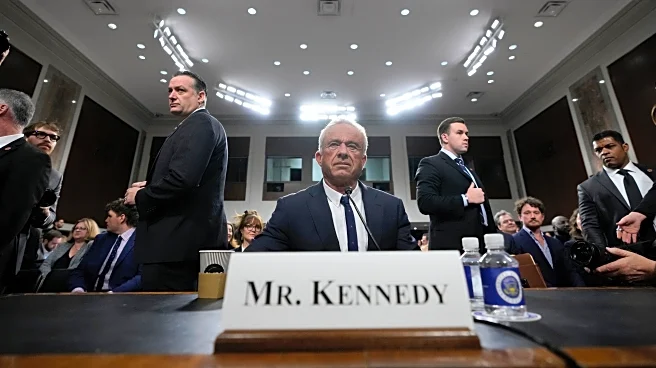What's Happening?
Target Corporation has announced its second quarter financial results for 2025, revealing a slight decline in net sales compared to the previous year. The company reported net sales of $25.2 billion, a 0.9% decrease from 2024. Despite this, Target experienced improved traffic and sales trends, particularly in physical stores, and a 4.3% growth in digital sales. The company's GAAP and Adjusted earnings per share (EPS) were $2.05, down from $2.57 in 2024. Target's operating income for the quarter was $1.3 billion, marking a 19.4% decrease from the previous year. The company also announced the appointment of Michael Fiddelke as the new CEO, succeeding Brian Cornell. Fiddelke is expected to focus on driving improved results and sustainable growth for the company.
Why It's Important?
The financial results and leadership change at Target Corporation are significant for the retail industry, as they reflect the challenges faced by major retailers in a competitive market. The decline in earnings and sales highlights the impact of tariff-related and other cost pressures. However, the growth in digital sales and non-merchandise revenues indicates a shift towards e-commerce and diversified income streams. The appointment of Michael Fiddelke as CEO is crucial as it signals a potential strategic shift in leadership, which could influence Target's future performance and market position. Stakeholders, including investors and competitors, will be closely monitoring how Fiddelke's leadership impacts Target's operational strategies and financial outcomes.
What's Next?
Target Corporation is maintaining its fiscal 2025 guidance, expecting a low-single digit decline in sales and GAAP EPS between $8.00 and $10.00. Adjusted EPS is projected to be approximately $7.00 to $9.00. As the company enters the back-to-school and holiday seasons, it aims to build momentum and focus on consistent execution. The leadership transition to Michael Fiddelke may bring new strategies to address ongoing challenges and capitalize on growth opportunities. Target's approach to digital sales and non-merchandise revenue growth will be key areas to watch as the company navigates the evolving retail landscape.
Beyond the Headlines
The leadership change at Target Corporation could have deeper implications for the company's culture and strategic direction. Michael Fiddelke's appointment may lead to shifts in corporate priorities, potentially affecting employee morale and stakeholder confidence. Additionally, Target's focus on digital sales growth reflects broader industry trends towards e-commerce, which could influence long-term shifts in consumer behavior and retail operations. The company's ability to manage cost pressures and adapt to market changes will be critical in maintaining its competitive edge.










